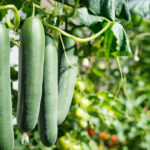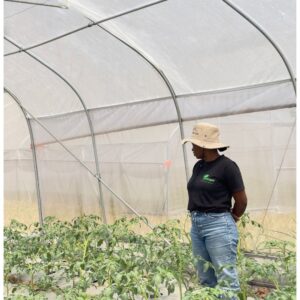Table of Contents
Greenhouse farming is rapidly gaining ground in Nigeria as a smarter, more controlled way to grow crops profitably all year round. But here’s the truth many new farmers miss: your location matters a lot.
Whether you’re farming in the North or South of Nigeria, your success with greenhouse farming depends on how well you understand and adapt to your local climate, soil, humidity, and sunlight levels.
In this guide, we break down the key differences between greenhouse farming in Northern and Southern Nigeria, and what you need to know to succeed in each region — with a focus on Afritropic seeds for optimal results.
Quick Overview
| Factor | Northern Nigeria | Southern Nigeria |
| Climate | Hot, dry (arid to semi-arid) | Humid, rainy (tropical rainforest) |
| Sunlight | Abundant all year | Moderate, often interrupted by clouds |
| Humidity | Low to moderate | Very high |
| Pest Pressure | Lower (in dry season) | Higher due to constant moisture |
| Rainfall | Short wet season, long dry season | Long wet season, short dry season |
| Rainfall | Heat management, irrigation | Ventilation, disease control |
1. Climate Considerations
Northern Nigeria: Regions like Kano, Katsina, Bauchi, and Kaduna experience intense sun and low humidity. This makes greenhouses highly efficient during the dry season. However, excessive heat during peak dry months can stress plants, especially if the greenhouse lacks good ventilation or shade nets.
Best Practices:
• Use shade nets or UV-protected plastic to reduce temperature.
• Invest in drip irrigation systems to manage water efficiently.
• Plant heat-tolerant Afritropic varieties like Platinum F1 tomatoes.
Southern Nigeria: States like Lagos, Ogun, Delta, and Rivers deal with constant rainfall, high humidity, and lower sunlight during rainy season. This environment increases the risk of fungal diseases inside the greenhouse and attracts more pests, especially if your greenhouse isn’t well-sealed.
Best Practices:
• Use anti-fungal nets and ensure maximum ventilation (roof vents, side openings).
• Consider using elevated beds or stones to avoid waterlogging.
• Plant Afritropic crops that handle humidity well, like cucumbers and peppers.
2. Water Management
In the North, irrigation is life without consistent water supply, your greenhouse farming efforts are useless.
In the South, you may need to control excess water and avoid moisture-related plant stress in your greenhouse farm.
Pro Tip: In both regions, automated drip irrigation is your best friend. It also saves time, money, and water.
3. Pest & Disease Pressure
The South faces more issues with fungus, mildew, whiteflies, aphids, etc., while the North experiences fewer pest outbreaks — except during short rainy spells.
What You Should Do:
• South: Apply preventive organic sprays, clean your greenhouse regularly, and use insect-proof netting.
• North: Monitor for thrips and mites during hot periods.
4. Cost vs Return on Investment
Greenhouse farming in the North tends to produce higher returns during dry seasons when open-field farmers struggle.
In the South, profits depend on how well you can manage humidity and pests making greenhouse farming necessary year-round to protect crops.
5. Design Adjustments by Region
In the North:
• Add shade netting (30–50%) on top of the greenhouse roof.
• Use evaporative cooling systems or mist sprays during peak heat.
In the South:
• Install extra roof ventilation and open sides.
• Use fungus-proof netting and elevate beds to prevent waterlogging.
• Consider taller greenhouses for better airflow.
Final Advice: Choose Location-Specific Strategies
No matter where you are in Nigeria, greenhouse farming can be extremely profitable, but only when you farm smart.
📌 If you’re in the North: Focus on cooling and water efficiency.
📌 If you’re in the South: Focus on ventilation and disease prevention.
Adapt your Afritropic crop selection, greenhouse materials, and management style to fit your environment, and you’ll be harvesting profits not problems.
Ready to Start Greenhouse Farming?
We can help you choose the right greenhouse design and Afritropic crop varieties that suit your region. Whether you’re in Sokoto or Port Harcourt, we’ve got you covered.
📩 Contact us today to get started with a greenhouse that works for YOUR climate.





